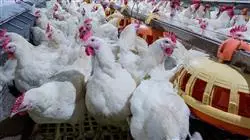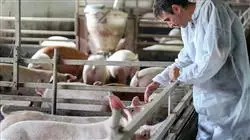University certificate
The world's largest faculty of veterinary medicine”
Introduction to the Program
A comprehensive update in Animal Production and Health with the most effective educational program on the online market’’

The Professional master’s degree in Animal Production and Health offers an integrated approach (in line with the concept of One Health) for professionals to develop tools enabling them to deal with the complexities of changing disease environments.
This integrative approach places greater emphasis on agroecological resilience, biodiversity protection, efficient use of natural resources, and maintaining the safety of food supply chains, particularly in technologically under-resourced areas. It also takes an in-depth look at the various animal diseases and their close relationship with human health and the environment.
The topics that make up this program focus on Animal Production and Health issues that impact on economic production and public health, such as: zoonotic diseases, transboundary diseases, disease transmission by species, specialist feeding, animal production and hygiene, safety in animal feed manufacturing, and strengthening veterinary systems.
Thus, TECH has designed this program for veterinarians who wish to update and build on their knowledge of Animal Production and Health. It should be noted that, being online, this program facilitates learning by allowing students to organize their schedule in the best possible way and to study when they like.
With this high-level program you will learn how to assess the impact of livestock production on public health’’
This Professional master’s degree in Animal Production and Health contains the most complete and up-to-date program on the market. The most important features include:
- The latest technology in online teaching software
- A highly visual teaching system, supported by graphic and schematic contents that are easy to assimilate and understand
- Case studies presented by practising experts
- State-of-the-art interactive video systems
- Teaching supported by telepractice
- Continuous updating and recycling systems
- Autonomous learning: full compatibility with other commitments
- Practical exercises for self-assessment and learning verification
- Support groups and educational synergies: questions to the expert, debate and knowledge forums
- Communication with the teacher and work for individual reflection
- Content that is accessible from any fixed or portable device with an Internet connection
- Supplementary documentation banks that are permanently available, even after the course
A comprehensive educational program that will allow you to acquire the most advanced knowledge of all the areas in which specialist veterinarians are involved’’
Our teaching staff is made up of professionals from different fields related to Animal Production and Health. In this way we ensure that we deliver an educational update in line with objectives. A multidisciplinary team of professionals trained and experienced in different areas, will cover the theoretical knowledge in an efficient way, but above all, will bring practical knowledge from their own experience to the course: one of the factors that makes this program unique.
This mastery of the subject matter is complemented by the effectiveness of the methodological design. Developed by a multidisciplinary team of e-learning experts, it integrates the latest advances in educational technology. In this way, you will be able to study with a range of easy-to-use and versatile multimedia tools that will give you the skills you need for your specialization.
The design of this program is based on Problem-Based Learning: an approach that conceives learning as a highly practical process. To achieve this remotely, we will use telepractice learning: with the help of an innovative interactive video system, and Learning from an Expert, you will be able to learn as if you were actually dealing with the scenario being studied. A concept that will allow you to integrate and fix learning in a more realistic and permanent way.
This innovative program will use a range of different teaching approaches to allow you to learn in a dynamic and effective way"

Benefit from the experience of practising professionals and the analysis of actual success stories, in a high-impact Professional master’s degree"
Why study at TECH?
TECH is the world’s largest online university. With an impressive catalog of more than 14,000 university programs available in 11 languages, it is positioned as a leader in employability, with a 99% job placement rate. In addition, it relies on an enormous faculty of more than 6,000 professors of the highest international renown.

Study at the world's largest online university and guarantee your professional success. The future starts at TECH”
The world’s best online university according to FORBES
The prestigious Forbes magazine, specialized in business and finance, has highlighted TECH as “the world's best online university” This is what they have recently stated in an article in their digital edition in which they echo the success story of this institution, “thanks to the academic offer it provides, the selection of its teaching staff, and an innovative learning method aimed at educating the professionals of the future”
A revolutionary study method, a cutting-edge faculty and a practical focus: the key to TECH's success.
The most complete study plans on the university scene
TECH offers the most complete study plans on the university scene, with syllabuses that cover fundamental concepts and, at the same time, the main scientific advances in their specific scientific areas. In addition, these programs are continuously being updated to guarantee students the academic vanguard and the most in-demand professional skills. In this way, the university's qualifications provide its graduates with a significant advantage to propel their careers to success.
TECH offers the most comprehensive and intensive study plans on the current university scene.
A world-class teaching staff
TECH's teaching staff is made up of more than 6,000 professors with the highest international recognition. Professors, researchers and top executives of multinational companies, including Isaiah Covington, performance coach of the Boston Celtics; Magda Romanska, principal investigator at Harvard MetaLAB; Ignacio Wistumba, chairman of the department of translational molecular pathology at MD Anderson Cancer Center; and D.W. Pine, creative director of TIME magazine, among others.
Internationally renowned experts, specialized in different branches of Health, Technology, Communication and Business, form part of the TECH faculty.
A unique learning method
TECH is the first university to use Relearning in all its programs. It is the best online learning methodology, accredited with international teaching quality certifications, provided by prestigious educational agencies. In addition, this disruptive educational model is complemented with the “Case Method”, thereby setting up a unique online teaching strategy. Innovative teaching resources are also implemented, including detailed videos, infographics and interactive summaries.
TECH combines Relearning and the Case Method in all its university programs to guarantee excellent theoretical and practical learning, studying whenever and wherever you want.
The world's largest online university
TECH is the world’s largest online university. We are the largest educational institution, with the best and widest online educational catalog, one hundred percent online and covering the vast majority of areas of knowledge. We offer a large selection of our own degrees and accredited online undergraduate and postgraduate degrees. In total, more than 14,000 university degrees, in eleven different languages, make us the largest educational largest in the world.
TECH has the world's most extensive catalog of academic and official programs, available in more than 11 languages.
Google Premier Partner
The American technology giant has awarded TECH the Google Google Premier Partner badge. This award, which is only available to 3% of the world's companies, highlights the efficient, flexible and tailored experience that this university provides to students. The recognition as a Google Premier Partner not only accredits the maximum rigor, performance and investment in TECH's digital infrastructures, but also places this university as one of the world's leading technology companies.
Google has positioned TECH in the top 3% of the world's most important technology companies by awarding it its Google Premier Partner badge.
The official online university of the NBA
TECH is the official online university of the NBA. Thanks to our agreement with the biggest league in basketball, we offer our students exclusive university programs, as well as a wide variety of educational resources focused on the business of the league and other areas of the sports industry. Each program is made up of a uniquely designed syllabus and features exceptional guest hosts: professionals with a distinguished sports background who will offer their expertise on the most relevant topics.
TECH has been selected by the NBA, the world's top basketball league, as its official online university.
The top-rated university by its students
Students have positioned TECH as the world's top-rated university on the main review websites, with a highest rating of 4.9 out of 5, obtained from more than 1,000 reviews. These results consolidate TECH as the benchmark university institution at an international level, reflecting the excellence and positive impact of its educational model.” reflecting the excellence and positive impact of its educational model.”
TECH is the world’s top-rated university by its students.
Leaders in employability
TECH has managed to become the leading university in employability. 99% of its students obtain jobs in the academic field they have studied, within one year of completing any of the university's programs. A similar number achieve immediate career enhancement. All this thanks to a study methodology that bases its effectiveness on the acquisition of practical skills, which are absolutely necessary for professional development.
99% of TECH graduates find a job within a year of completing their studies.
Professional Master's Degree in Animal Production and Health
.
Care in animal production and protection is a point of great attention nowadays, which is why specialized professionals who can carry out prevention processes competently and efficiently are sought after. In the Professional Master's Degree in Animal Production and Health at TECH Global University we focus on providing high quality content, accompanied by an agroecological resilience look with which you can ensure the protection of both the existing biodiversity and natural resources of the region. In addition, throughout this comprehensive program you will obtain an objective and critical look that will allow you to analyze in depth the impact of livestock production on public health, designing efficient action plans to counteract the problems encountered.
Professional Master's Degree in Animal Production and Health 100% online
.
The Professional Master's Degree in Animal Production and Health at TECH was designed by the best specialists in veterinary medicine. Therefore, you have the possibility of accessing new thematic axes related to anatomy, physiology, dog health and animal nutrition, as well as other thematic approaches that will be of utmost importance to develop with total security in professional practice. In addition, in our 1,500 instructional hour program we will delve into various animal diseases and their close connection to human health and the environment, as the goal is for you to be able to respond efficiently in the event of a health crisis.







